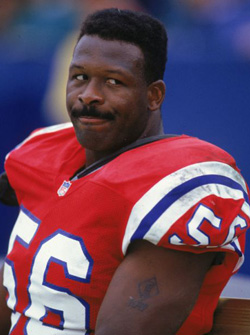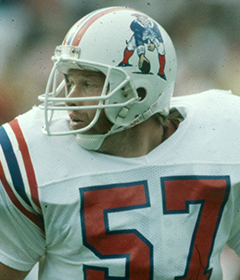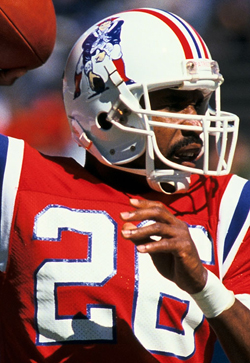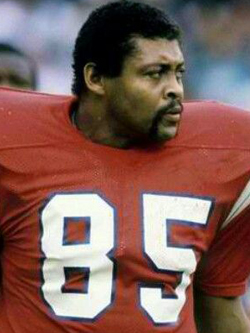|
Super Bowl XX - Chicago Bears vs New England Patriots: Pregame
The Chicago Bears' ascent to Super Bowl XX began the year before - 1984.
- In former Bear TE Mike Ditka's second full season as head coach, they improved from 8-8 in '83 - their first .500 or better record in four years - to 10-6 to win the NFC North Division and earn their first playoff berth since 1979. The Bears were second to the 49ers in the NFC in fewest points allowed (248) and seventh in points scored (325).
- Ditka, whose experience was on the offensive side of the ball, inherited Buddy Ryan as defensive coordinator, a post he had held since 1978.
A new coach customarily gets to hire his own staff, including the important defensive coordinator position. But the Bears defensive standouts wrote a letter to owner George Halas urging him to retain Ryan and his defensive coaches. "Buddy has maintained the discipline, morale, pride and effort that we need in order to play well defensively, in spite of the fact that we haven't had much help from the offensive team." Halas agreed to their proposal.
- The result was a rift and rivalry between the offense and defense. They traveled on separate buses and attended separate meetings. In effect, Ditka was head coach of the offense and Ryan the head coach of the defense.
The two strong-willed men hated each other and often clashed in front of the entire team on the practice field, in the locker room, and at halftimes of games. If Mike tried to make a suggestion to Ryan, Buddy told him where to go and walked away. As one writer put it, "Ditka and Ryan went jaw-to-jaw more often than they saw eye-to-eye."
- A divided squad usually has a disastrous season, but the competition between the two units actually helped the team. Every practice turned into a battle, and the two sides drove each other to improve week after week. Sometimes fights broke out during scrimmages.
Ryan created the "46" defense when he came to the Bears in 1978.
"46" was the jersey number of S Doug Plank, "the Human Missile," who retired in 1982. He epitomized Buddy's ideal player because he was smart and a hard hitter.
- The 46 was a fluid defense that virtually eliminated traditional positions. It often gave the appearance of an eight-man front with LBs Otis Wilson and Wilber Marshall shoulder-to-shoulder over the tight end. Either or both might rush or drop back. DTs Dan Hampton, Steve McMichael, and Mike Hartenstine occupied the center and the two guards. DE Richard Dent played opposite the tight end while LB Mike Singletary, FS Gary Fencik, and SS Dave Duerson functioned as wild cards, lining up somewhere between the two edges of the front line depending on the offensive formation.
Ryan trusted Singletary to make the calls on the field. "Nobody studied more film than Mike Singletary," said LB Cliff Thrift. "Nobody worked harder than Mike, tried harder than Mike, and nobody was harder on Mike than Mike was. Mike Singletary was Buddy Ryan's godsend. I think Buddy considered Singletary an ally and basically an extension of him on the field."
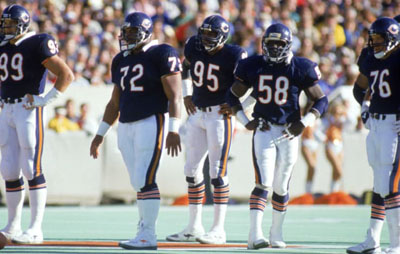
L-R: Dan Hampton, William Perry, Richard Dent, Wilber Marshall, Steve McMichael
- In passing situations, the 46 created blitzing opportunities that limited double-team blocking and put talented Bear defenders in one-on-one matchups they would usually win. This forced confused quarterbacks to hold the ball waiting for a receiver to come open, thus opening themselves to getting drilled, or throw the ball before receivers had run their patterns.
DE Dan Hampton explained: "Our defense was designed to jump hot, meaning make the quarterback go to the second guy. In that split second it takes to come off the primary and go to the second or third [receiver] is when we got there."
- The objective on running plays was to force ball carriers to go sideways, making them delicious targets for the speedy linebackers and safeties.
- The 46 defense literally made opposing quarterbacks quake in their cleats. They knocked out not one but two Los Angeles Raiders' signal-callers in Week 10, Marc Wilson and David Humm.
The '84 Bears would have done better had QB Jim McMahon not suffered a lacerated kidney in that brutal victory over the Raiders in Week 10.
- The Bears lost three of their final six games without McMahon under center. That cost them a shot at the #1 seed in the NFC playoffs.
- Chicago beat the Redskins in Washington 23-19 in the first round for their first playoff win since 1963. But they lost the NFC title game 23-0 to the 49ers, who then smashed the Dolphins 38-16 in the Super Bowl.
Their success in 1984 made the Bears hungry for more in '85.
- With 18 of 22 starters returning, the only newcomer in the lineup was rookie DT William Perry. Picking him was considered "a gamble" by most NFL pundits. The decision made by Ditka and personnel director Bill Tobin infuriated Ryan, who resented the fact that the head coach didn't consult him on draft picks.
Perry received "The Refrigerator" nickname at Clemson where he weighed 315 lbs as a freshman and later ballooned to 380. He reported to training camp completely out of shape after missing the first two weeks because of a contract dispute.
Ryan, who didn't like rookies since he couldn't trust them to run his complicated defense, called Perry "a wasted draft pick."
- DE Dan Hampton recalled: "It was a brutal (training) camp in '85. Ditka wasn't going to let up. We were close, he could smell it, he had his foot on the throttle."
Hampton on Perry: "Fridge was a terrific athlete who would kind of go through the motions. He could have been terrific on the nose. But in the latter part of '85, Buddy had ridiculed him to the point where he had gotten in somewhat shape at 320."
- The Ditka/Ryan team was 10/1 to win the Super Bowl, which ranked fifth behind the 49ers (3/1), Raiders (8/1), Dolphins (8/1), and Seahawks (9/1). But it didn't take many weeks into the season to realize that the Bears were much better than their odds.
- They won their first five games by no fewer than nine points to set up a showdown with the 49ers. The 26-10 thumping of the defending champions in their stadium silenced any remaining doubters.
Singletary: "I'd call the defensive signals, and out of the '46' I could choose between as many as 50 plays. Normally, when a quarterback comes to the line and looks at a strong defensive alignment, he says, 'Oh, I'm going to check out of this into an offense I can really hurt those guys with.' But I could call something else to counter what he was going to do. It was sort of like chess. I could say, 'I'm going to put our best defense against that offense, and no matter where you go, I've got you.' At any given time, we had one play for every offensive set. So the offense didn't know who was coming or how we were coming. Quarterbacks just couldn't read the '46.'"
The Bears were 12-0 when they flew to Miami to meet the Dolphins on Monday Night Football.
- Don Shula's defending AFC champs had extra motivation to win in order to preserve the '72 Dolphins status as the NFL's only undefeated team.
- Unfortunately for the Bears, the reckless McMahon was injured again. So Steve Fuller started his fourth straight game. Miami had a huge edge at quarterback with Dan Marino, who as a rookie in 1984 broke six single-season NFL passing records.
- The Dolphins never trailed in the game as they forged a shocking 31-10 halftime lead. The Bears salvaged some pride by outscoring the home team 14-7 in the second half, but it wasn't enough to stop Shula and the '72 Dolphins from uncorking the champagne to celebrate another season as the only undefeated NFL team in the modern era.
- With McMahon back the next week, the Bears righted the ship and won their final three games to finish 15-1 and claim the #1 seed in the NFC playoffs.
- Chicago became the first NFL team to pitch back-to-back shutouts in the postseason: 21-0 over the New York Giants and 24-0 over the Los Angeles Rams.
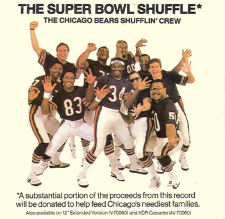 |
Perhaps nothing epitomizes the spirit of the '85 Bears (some would say arrogance) than "The Super Bowl Shuffle." This was a seven-minute rap song/video in which most of the Bears participated right after the loss to the Dolphins. Released through Capital Records, it quickly became a mainstream phenomenon, selling more than 500,000 copies and reaching No. 41 on the Billboard Hot 100. Over $300,000 in profits from the song was donated to the Chicago Community Trust to help needy families. The song was nominated for a Grammy Award. |
The New England Patriots' journey to the Super Bowl was the reverse of the Bears.
- Raymond Berry's club lost three of their first five games, including a 20-7 road setback at the hands of the Bears. Then they won six in a row on their way to an 11-5 finish that earned them a wild card spot in the AFC playoffs.
- They faced the challenge of winning three games on the road to make the Super Bowl, and that's exactly what they did. They beat the Jets 26-14, the Raiders 27-20, and capped off their hot streak with a 31-14 thumping of the Dolphins at the same venue that provided Chicago with their only loss. It was the Patriots' first victory ever at the Orange Bowl.
The Bears were rooting for Miami in the AFC title game. "Our team wanted to play the Dolphins to avenge the Monday night loss," recalled Hampton. "The Dolphins must have been looking ahead. They didn't take care of business. The Patriots came in there and ran the ball and beat them."
However, as Ditka recalled, "Despite the difference in our records - the Patriots were 11-5 - we weren't about to take them lightly. They won three tough games in the playoffs - all on the road - to get into the Super Bowl. They had players who knew how to win games under pressure."
Like the Bears, the Pats' defense outperformed the offense.
- Coordinator Rod Rust's defense ranked second in the AFC (18.1ppg). The #7 offense of Rod Humenuik averaged 22.6 ppg.
- The Patriots' postseason success was based on conservative field-position football, hard hitting, and taking advantage of opponents' mistakes.
- The leader of the defense was LOLB Andre Tippett, who was named the AFC defensive player of the year after leading the conference with 16 1/2 sacks. Two of his fellow linebackers, ILB Steve Nelson, the defensive captain and signal caller, and CB Raymond Clayborn.
- The emotional leader of the defense was 14-year veteran E Julius Adams, who announced he would retire after the Super Bowl.
The New England offense featured the running of 1st-team All-Pro FB Craig James, who gained 1,227y, which was 570 more than the next Patriot runner, Tony Collins.
- After a shaky start at the beginning of the season, QB Tony Eason was replaced by Steve Grogan after five games. But when Grogan got hurt in Game #12, Eason got a second chance. The coaches changed their play-calling to resemble that of the successful Grogan, who had been allowed to call his own plays. The results were amazing. Eason completed almost 70% of his passes in the playoffs, throwing for five touchdowns with no interceptions.
- The question for the Super Bowl was whether the Pats' offensive line could protect Eason well enough to allow him to attack the Bears' only vulnerable spot by throwing long to Stanley Morgan or Stephen Starring.
Super Bowl XX turned out to be one of the few in which the week leading up to the game was more interesting than the game itself. The tumult infusing the Bears' season continued into Super Bowl week with QB Jim McMahon at the center of most of it. No player had attracted so much attention since Joe Namath before Super Bowl III.
- McMahon, described by Jim Murray of the Los Angeles Times as "part pool hall hustler, part drugstore cowboy and all wise guy," had suffered a bruised left buttock in the NFC title game against the Rams. He needed his wife to help him put on his socks before departing Chicago on Monday. Upon arriving in New Orleans, McMahon blasted team owner Michael McCaskey for barring Jim's acupuncturist from the charter flight. After getting an earful from his quarterback before Tuesday's practice and Ditka expressing doubt on Wednesday that Jim could play, McCaskey relented and paid for the acupuncturist to come to New Orleans.
Ditka later said McMahon "was 200% better" after the acupuncture treatment.
- When a helicopter circled overhead at the Bears' practice Wednesday, McMahon bent over, yanked down his pants, and "showed 'em where it hurt."
Bears LB Mike Singletary recalled: "During Super Bowl week in New Orleans, the defense and offense fought a lot during the scrimmages. It was just natural. We were friends, but there'd be one guy who felt his man kept going after the whistle was blown; another guy wo felt his man was trying to cut him; another guy who'd think his man was doing something unnecessary in practice. So much intensity and rage. There was no way you could put all that combined energy together on the practice field and not have it explode. The fighting would end when practice ended, and at night, the offense and defense hung out together in New Orleans." Mike, however, kept his nose to the grindstone. "I went out to eat only one time. On all other nights, I just stayed in my hotel room and had room service. I just turned on my projector and studied film of the Patriots all week."
- Wednesday night, New Orleans sportscaster Buddy Diliberto reported that McMahon had called the women of New Orleans "sluts" and the men "idiots" during an interview on a Chicago radio station that morning. At Diliberto's urging, women showed up the next morning outside the Bears' hotel ready to pelt the Bear quarterback with rolls of toilet paper. However, the story was quickly debunked, and Diliberto was suspended by his station for two weeks.
- Jim gave the media his own injury report wearing his usual sunglasses indoors. "My unmentionable still hurts. It is getting better. I can't drop back to pass now, but I can backpedal. The closer we get to game time, the better it'll feel. I'll play Sunday."
Somebody asked McMahon how he characterized himself. "Normal," he replied. "I'm normal because I don't give a damn what people think. I don't care what people think of my lifestyle. I'm here to play football." If you didn't know what college he came from, you'd never have guessed it was Brigham Young.
The Patriots were the forgotten team in Super Bowl XX as the Bears sucked up the media attention.
- "I think we were probably a little jealous about all the attention they were getting," recalled Steve Grogan. "But we were kind of used to flying under the radar, having played those three games on the road. Nobody expected us to win those. We just went about our business and got ready to play the game."
- Starting QB Tony Eason was a likeable lad who did not wear sunglasses indoors and didn't experience pain when he sat down. "I don't really care about image," he told the few writers who interviewed him. "I'm just plain me."
- The rival teams reflected the personalities of their coaches. Berry was quiet and refined, an overachiever whose relentless work ethic with Johnny Unitas on the Colts made him a Hall of Fame receiver. His wild card team had beaten the odds by upsetting three playoff foes on the road. By contrast, Ditka, like his team, was boisterous, earthy, volatile, and confident to the point of cockiness. Mike provided much more fodder to the media than Raymond.
In the two weeks of preparation for the Super Bowl, Coach Berry decided to change the offensive plan that had produced three road playoff victories.
The Chicago defense didn't need any further motivation for the Super Bowl, but they got some anyway in their last meeting the night before the game.
- Rumors had circulated that the Philadelphia Eagles wanted Ryan as their head coach. Buddy had dismissed the topic to avoid distracting his players.
- When Ryan did not pass out the usual reminders as he always did at the final meeting, the players knew something was up. Instead he teared up as he said, "No matter what happens tomorrow, you'll always be my heroes." Then he walked out. You could hear grown men weeping.
- As defensive line coach Dale Haupt prepared to show one final reel of Patriots film, Dan Hampton got up and kicked the projector over. Steve McMichael said, "What a bunch of crybabies. We're getting ready to play the most important game of our lives, and all you guys can do is whine about this?" Then he grabbed a chair and fired it into a chalkboard where it stuck. "He started the projector, and I couldn't take it," recalled Hampton. "We'd seen the same film 25 times.. It was like you know your folks are getting divorced, but you're always hoping it ain't going to happen. But when Buddy said that, we knew it was over."
Actually, several Bears had learned about Ryan leaving several days earlier. "(Gary) Fencik came up to me on Thursday that week," said Hampton. "He said it was official that Buddy was going to take the job in Philly. He said, 'Whatever you do, don't tell Singletary.' It was because Singletary would become an emotional wreck."
When Ryan left the final meeting, Fencik told Mike about Buddy's new job. "I just didn't believe that Buddy would leave without telling me," said Singletary. "But he was smart enough to know I wasn't mature enough to handle him leaving. I probably would not have played very well if I really believed that going into the game."
Later, when Ditka was asked if he was happy that Buddy was leaving, Mike said, "Happy? No, I'm not happy. I'm elated."
Jimmy the Greek pronounced the Bears 10 1/2-point favorites.
It was NBC's turn to televise the game.
- Dick Enberg did the play-by-play with Merlin Olsen and Bob Griese providing commentary.
- The game drew an estimated 92.6 million viewers, the largest TV audience to that point in history. A 30-second commercial cost $550,000.
- NBC also did the radio broadcast with announcers Don Criqui and Bob Trumpy.
As game time approached, the Bears' defense regained their focus.
- Singletary recalled: "The locker room started out pretty quiet with guys just talking to each other about the game plan. But the closer we got to game time, the louder it got. More guys starting hitting their heads and throwing stuff around and kicking things and screaming and there was a let-me-out-of-here kind of atmosphere."
- Mike added: "I can still remember it like it was yesterday. We're standing there holding hands, and there were those huge doors at the Superdome and the stadium in absolute pandemonium. It was so loud and the emotion was so thick that we could not even talk to each other. Tears were streaming down our faces. It was a magical moment before the game. ... We knew that we were going to go out and win."
|
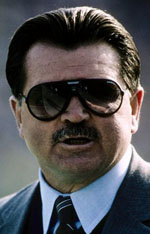
Mike Ditka

Buddy Ryan
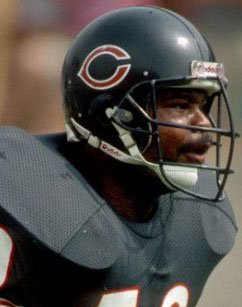
Mike Singletary
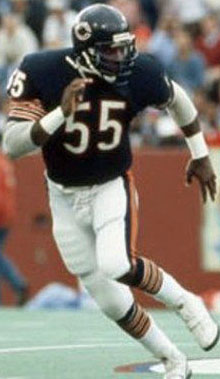
Otis Wilson
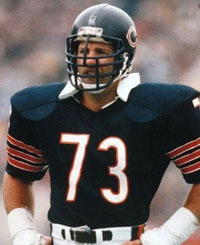
Mike Hartenstine
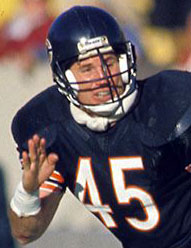
Gary Fencik
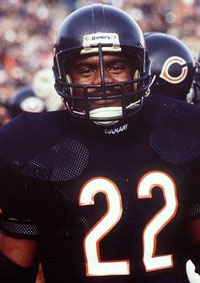
Dave Duerson

Jim McMahon and George Halas

Steve Fuller
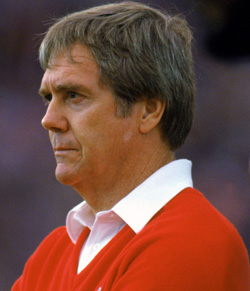
Raymond Berry
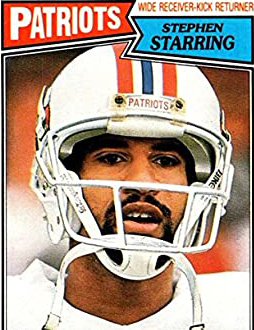
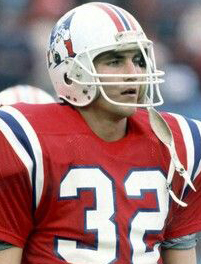
Craig James
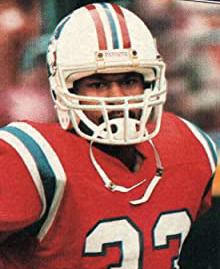
Tony Collins
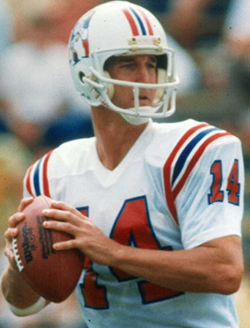
Steve Grogan
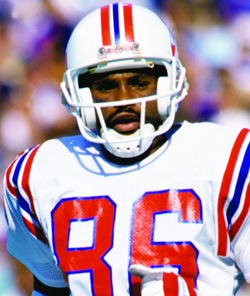
Stanley Morgan
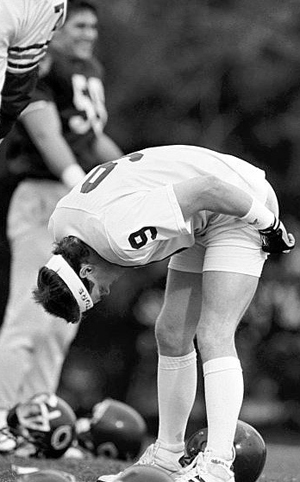
McMahon moons helicopter.
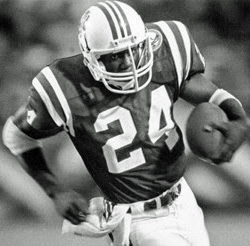
Robert Weathers
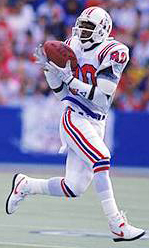
Irving Fryar
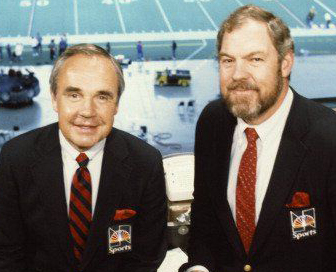
Dick Enberg and Merlin Olsen
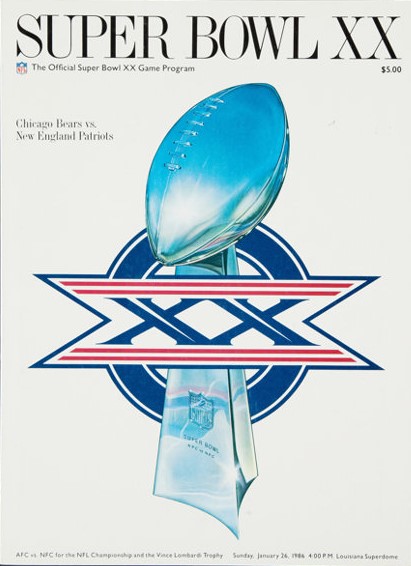
|
1985 Chicago Bears
| # |
Player |
Pos. |
Hgt. |
Wgt. |
College |
Exp. |
| 4 |
Steve Fuller |
QB |
6-4 |
195 |
Clemson |
8 |
| 6 |
Kevin Butler |
K |
6-1 |
205 |
Georgia |
1 |
| 8 |
Maury Buford |
P |
6-1 |
190 |
Texas Tech |
5 |
| 9 |
Jim McMahon |
QB |
6-1 |
190 |
Brigham Young |
5 |
| 18 |
Mike Tomczak |
QB |
6-1 |
195 |
Ohio State |
1 |
| 20 |
Thomas Sanders |
RB |
5-11 |
205 |
Texas A&M |
1 |
| 21 |
Leslie Frazier |
CB |
6-0 |
190 |
Alcorn State |
6 |
| 22 |
Dave Duerson |
S |
6-1 |
205 |
Notre Dame |
4 |
| 23 |
Shaun Gayle |
CB |
5-11 |
195 |
Ohio State |
3 |
| 26 |
Matt Suhey |
RB |
5-11 |
215 |
Penn State |
7 |
| 27 |
Mike Richardson |
CB |
6-0 |
190 |
Arizona State |
4 |
| 29 |
Dennis Gentry |
RB |
5-8 |
180 |
Baylor |
5 |
| 31 |
Ken Taylor |
CB |
6-1 |
185 |
Oregon State |
1 |
| 33 |
Calvin Thomas |
RB |
5-11 |
245 |
Illinois |
5 |
| 34 |
Walter Payton |
RB |
5-10 |
200 |
Jackson State |
12 |
| 45 |
Gary Fencik |
S |
6-1 |
195 |
Yale |
11 |
| 48 |
Reggie Phillips |
CB |
5-10 |
170 |
SMU |
1 |
| 50 |
Mike Singletary |
LB |
6-0 |
230 |
Baylor |
6 |
| 51 |
Jim Morrissey |
LB |
6-3 |
215 |
Michigan State |
1 |
| 52 |
Cliff Thrift |
LB |
6-1 |
230 |
East Central Oklahoma |
8 |
| 54 |
Brian Cabral |
LB |
6-1 |
225 |
Colorado |
8 |
| 55 |
Otis Wilson |
LB |
6-2 |
230 |
Louisville |
7 |
| 57 |
Tom Thayer |
G-C |
6-4 |
260 |
Notre Dame |
1 |
| 58 |
Wilber Marshall |
LB |
6-1 |
225 |
Florida |
3 |
| 59 |
Ron Rivera |
LB |
6-3 |
240 |
California |
3 |
| 60 |
Tom Andrews |
C |
6-4 |
265 |
Louisville |
3 |
| 62 |
Mark Bortz |
G |
6-6 |
270 |
Iowa |
4 |
| 63 |
Jay Hilgenberg |
C |
6-3 |
260 |
Iowa |
6 |
| 70 |
Henry Waechter |
DT |
6-5 |
275 |
Nebraska |
5 |
| 71 |
Andry Frederick |
T |
6-6 |
265 |
New Mexico |
10 |
| 72 |
William Perry |
DT |
6-2 |
310 |
Clemson |
1 |
| 73 |
Mike Hartenstine |
DE |
6-3 |
255 |
Penn State |
12 |
| 74 |
Jimbo Covert |
T |
6-4 |
270 |
Pittsburgh |
4 |
| 75 |
Stefan Humphries |
G |
6-3 |
265 |
Michigan |
3 |
| 76 |
Steve McMichael |
DT |
6-2 |
260 |
Texas |
7 |
| 78 |
Keith Van Horne |
T |
6-6 |
280 |
USC |
6 |
| 80 |
Tim Wrightman |
TE |
6-3 |
235 |
UCLA |
1 |
| 82 |
Ken Margerum |
WR |
6-0 |
180 |
Stanford |
5 |
| 83 |
Willie Gault |
WR |
6-1 |
185 |
Tennessee |
4 |
| 85 |
Dennis McKinnon |
WR |
6-1 |
185 |
Florida State |
4 |
| 87 |
Emery Morehead |
TE |
6-2 |
220 |
Colorado |
10 |
| 89 |
Keith Ortego |
WR |
6-0 |
180 |
McNeese State |
1 |
| 95 |
Richard Dent |
DE |
6-5 |
265 |
Tennessee State |
4 |
| 98 |
Tyrone Keys |
DE |
6-7 |
265 |
Mississippi State |
4 |
| 99 |
Dan Hampton |
DE-T |
6-5 |
265 |
Arkansas |
8 |
|
1985 New England Patriots
| # |
Player |
Pos. |
Hgt. |
Wgt. |
College |
Exp. |
| 1 |
Tony Franklin |
K |
5-8 |
180 |
Texas A&M |
8 |
| 3 |
Rich Camarillo |
P |
5-11 |
185 |
Washington |
6 |
| 11 |
Tony Eason |
QB |
6-4 |
210 |
Illinois |
4 |
| 12 |
Tom Ramsey |
QB |
6-5 |
235 |
Kentucky |
9 |
| 14 |
Steve Grogan |
QB |
6-4 |
210 |
Kansas State |
12 |
| 23 |
Rod McSwain |
CB |
6-1 |
200 |
Clemson |
3 |
| 24 |
Robert Weathers |
RB |
6-2 |
220 |
Arizona State |
5 |
| 26 |
Raymond Clayborn |
CB |
6-0 |
185 |
Texas |
10 |
| 27 |
Greg Hawthorne |
WR-RB |
6-2 |
225 |
Baylor |
8 |
| 28 |
Jim Bowman |
S |
6-2 |
210 |
Central Michigan |
1 |
| 30 |
Mosi Tatupu |
RB |
6-0 |
225 |
USC |
9 |
| 31 |
Fred Marion |
S |
6-2 |
190 |
Miami |
5 |
| 32 |
Craig James |
RB |
6-0 |
215 |
SMU |
3 |
| 33 |
Tony Collins |
RB |
5-11 |
210 |
East Carolina |
6 |
| 38 |
Roland James |
S |
6-2 |
190 |
Tennessee |
7 |
| 42 |
Ronnie Lippett |
CB |
5-11 |
180 |
Miami |
4 |
| 43 |
Ernest Gibson |
CB |
5-10 |
185 |
Furman |
3 |
| 50 |
Larry McGrew |
LB |
6-5 |
235 |
USC |
6 |
| 51 |
Brian Ingram |
LB |
6-4 |
235 |
Tennessee |
5 |
| 52 |
Johnny Rembert |
LB |
6-3 |
235 |
Clemson |
4 |
| 54 |
Ed Williams |
LB |
6-4 |
245 |
Texas |
3 |
| 55 |
Don Blackmon |
LB |
6-3 |
235 |
Tulsa |
6 |
| 56 |
Andre Tippett |
LB |
6-3 |
240 |
Iowa |
5 |
| 57 |
Steve Nelson |
LB |
6-2 |
230 |
North Dakoa State |
13 |
| 58 |
Pete Brock |
C |
6-5 |
275 |
Colorado |
11 |
| 60 |
Garin Veris |
DE |
6-4 |
255 |
Stanford |
1 |
| 61 |
Ron Wooten |
G |
6-4 |
275 |
North Carolina |
5 |
| 66 |
Paul Fairchild |
G |
6-4 |
270 |
Kansas |
3 |
| 67 |
Steve Moore |
T |
6-4 |
285 |
Tennessee State |
4 |
| 70 |
Art Plunkett |
T |
6-7 |
260 |
Nevada-Las Vegas |
6 |
| 72 |
Lester Williams |
NT |
6-3 |
270 |
Miami |
5 |
| 73 |
John Hannah |
G |
6-3 |
265 |
Alabama |
14 |
| 75 |
Guy Morriss |
C-G |
6-4 |
255 |
TCU |
14 |
| 76 |
Brian Holloway |
T |
6-7 |
290 |
Stanford |
6 |
| 80 |
Irving Fryar |
WR |
6-0 |
200 |
Nebraska |
3 |
| 81 |
Stephen Starring |
WR |
5-10 |
170 |
McNeese State |
4 |
| 83 |
Cedric Jones |
WR |
6-1 |
185 |
Duke |
5 |
| 85 |
Julius Adams |
DE |
6-3 |
270 |
Texas Southern |
15 |
| 86 |
Stanley Morgan |
WR |
5-11 |
180 |
Tennessee |
10 |
| 87 |
Lin Dawson |
TE |
6-3 |
240 |
North Carolina State |
6 |
| 88 |
Derrick Ramsey |
TE |
6-5 |
235 |
Kentucky |
9 |
| 92 |
Smiley Creswell |
DE |
6-4 |
250 |
Michigan State |
2 |
| 95 |
Ed Reynolds |
LB |
6-5 |
230 |
Virginia |
4 |
| 98 |
Dennis Owens |
NT |
6-1 |
260 |
North Carolina State |
5 |
| 99 |
Ben Thomas |
DE |
6-4 |
280 |
Auburn |
1 |
|
References: The Super Bowl: Celebrating a Quarter-Century of America's Greatest Game (1990)
Super Bowl Chronicles: A Sportswriter Reflects on the First 30 Years of America's Game, Jerry Green (1995)
Super Bowl: The Game of Their Lives, Danny Peary (ed.) (1997)
The Football Game I'll Never Forget: 100 NFL Stars' Stories, selected by Chris McDonell (2004)
In Life, First You Kick Ass, Mike Ditka with Rick Telander (2005)
The Ultimate Super Bowl Book, Bob McGinn (2009)
Da Bears! How the 1985 Monsters of the Midway Became the Greatest Team in NFL History, Steve Delsohn (2010)
Monsters: The 1985 Chicago Bears and the Wild Heart of Football, Rich Cohen (2013)
50 Years, 50 Moments: The Most Unfo
old: 50 Years of the Big Game, Sports Illustrated (2015)
The Super Bowl: The First Fifty Years of America's Greatest Game, David Fischer (2015)
The First 50 Super Bowls: How Football's Championships Were Won, Ed Benkin (2018)
|
|
